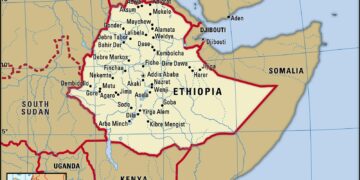The World Food Programme (WFP) has issued a stark warning regarding the escalating levels of hunger and malnutrition in Ethiopia, where humanitarian needs are reportedly outpacing available resources. As millions of Ethiopians struggle with food insecurity, the WFP’s latest assessment highlights a critical situation exacerbated by ongoing conflict, climate change, and economic instability. With humanitarian aid efforts stretched thin, the need for immediate international support has become more urgent than ever, prompting calls for increased assistance to avert a looming crisis that threatens the health and well-being of vulnerable populations across the country. This article delves into the factors contributing to this alarming trend and the implications for Ethiopia’s future.
WFP Urges Immediate Action as Hunger Crisis Deepens in Ethiopia
The United Nations World Food Programme (WFP) has issued a stark warning regarding the escalating hunger and malnutrition crisis in Ethiopia, where millions face severe food insecurity exacerbated by conflict, climate change, and rising costs of living. With approximately 20 million people in need of assistance, the scale of humanitarian needs is overwhelming. Despite the urgent demand for aid, resources are falling significantly short, hindering the WFP’s ability to deliver essential support to those affected. The agency highlighted that the intricate web of challenges—such as disrupted supply chains and ongoing conflict—continues to worsen the situation, leaving vulnerable populations at even greater risk.
To combat this dire situation, immediate and coordinated action is crucial. The WFP has outlined several priorities for the coming months to address these growing needs effectively:
- Increase Food and Nutrition Assistance: Expanding distributions to reach affected communities.
- Support Livelihoods: Implementing programs to help households rebuild their resilience.
- Enhance Nutritional Support: Targeting malnourished children and pregnant women to safeguard health.
- Strengthen Partnerships: Collaborating with local organizations to optimize resource allocation.
In light of this increasing crisis, WFP has appealed for significant funding to avert a humanitarian catastrophe. The table below summarizes the estimated number of people in need of assistance across various regions of Ethiopia:
| Region | Population in Need (millions) |
|---|---|
| Tigray | 5.5 |
| Amhara | 7.0 |
| SNNP | 4.0 |
| Oromia | 3.5 |
Growing Malnutrition Rates Demand Urgent Humanitarian Assistance
The United Nations World Food Programme (WFP) has issued a stark warning regarding the alarming increase in hunger and malnutrition rates in Ethiopia. This humanitarian crisis has emerged as a result of ongoing conflicts, climate shocks, and economic challenges, which have severely disrupted food security across the nation. A recent assessment highlights the urgent need for intervention, as resources available to address these pressing issues are rapidly dwindling, making it essential for the international community to respond without delay.
In Ethiopia, the impact of malnutrition is being felt most acutely among vulnerable populations, including children and pregnant women. Key statistics emphasize the severity of the situation:
| Demographic Group | Malnutrition Rate (%) | Children Under Five | Pregnant Women |
|---|---|---|---|
| General Population | 31.9% | 6.8 million | 1.8 million |
| Acute Malnutrition | 16% | 2.3 million | N/A |
The following factors contribute to the deepening crisis:
- Prolonged Conflict: Ongoing hostilities exacerbate displacement and disrupt agricultural activities.
- Climate Change: Erratic weather patterns have led to devastating droughts and floods, impacting crop production.
- Economic Downturn: Rising food prices and reduced income opportunities limit access to essential nutrition.
Recommendations for Strengthening Response Efforts to Combat Food Insecurity in Ethiopia
To effectively tackle the escalating food insecurity crises in Ethiopia, immediate and coordinated efforts are essential. Key stakeholders, including government entities, NGOs, and international agencies, should enhance collaboration to foster a multi-faceted approach. This can be achieved by:
- Improving data collection: Regular assessments are vital to understand the evolving landscape of hunger and malnutrition.
- Expanding agricultural support: Providing farmers with resources such as seeds, fertilizers, and technical assistance can boost local production.
- Establishing safety nets: Implementing social protection programs can help vulnerable populations withstand economic shocks and prevent them from falling into food insecurity.
- Fostering community engagement: Localized initiatives that involve communities in decision-making can enhance the effectiveness of interventions.
Furthermore, scaling up funding is crucial to meet the growing humanitarian needs. A shift towards long-term development strategies will complement immediate relief efforts while addressing the root causes of food insecurity. Key measures to consider include:
- Mobilizing international support: Engaging with donor countries and organizations to secure financial backing for food assistance programs.
- Establishing local partnerships: Collaborating with local businesses and organizations can create sustainable resources and innovation in food distribution.
- Advocating for policy reforms: Encouraging government policies that prioritize agricultural resilience and food security initiatives can lay a foundation for lasting changes.
| Challenge | Recommended Action |
|---|---|
| Data inadequacy | Enhance periodic assessments |
| Low agricultural productivity | Provide resources to farmers |
| Vulnerability to shocks | Implement social protection systems |
| Insufficient funding | Mobilize international support |
The Way Forward
In conclusion, the World Food Programme’s urgent warning highlights the escalating humanitarian crisis in Ethiopia, where hunger and malnutrition are reaching alarming levels as the gap between needs and available resources widens. The situation demands immediate international attention and support, as millions of Ethiopians face an uncertain future without adequate food and nutrition. As the WFP actively seeks to mobilize additional funding and resources, the global community must respond with compassion and urgency to alleviate the suffering of those affected. The time to act is now, for the health and well-being of countless individuals hang in the balance.















